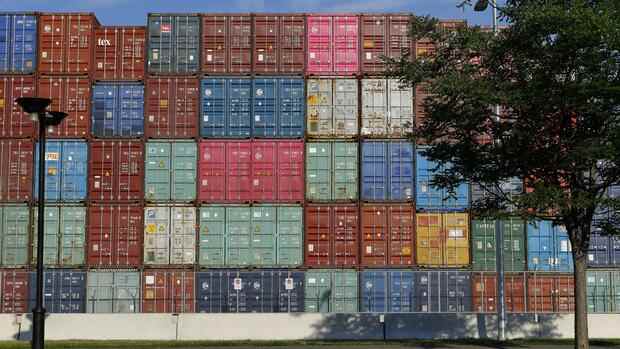Berlin The simple abbreviation “ZP 17, TOP 9” on the agenda hardly did justice to the topic that was debated in the Bundestag on Thursday evening: The governing coalition has initiated the ratification of the European-Canadian free trade agreement Ceta.
For almost five years, first the grand coalition and later the traffic lights were unable to finalize Ceta. But the geopolitical turning point has shifted perspectives on trade policy. Negotiations that have long been shelved are back on the agenda in Berlin and Brussels.
The German government and the EU Commission recently presented guidelines for a value-based trade policy. After years of stalemate, politicians and officials are now working to a daily rhythm – not only at Ceta, but also at Mercosur, Chile, Mexico, Australia and India.
Last week, the EU Commission signed the first agreement with the renewed standards with New Zealand. But there are still obstacles to further agreements.
The Ceta law is also still subject to change. The agreement has been in force provisionally for almost five years. For full implementation, however, the national parliaments must ratify it.
Passages on investment protection and arbitration in the contract are extremely controversial. In the new federal government, the Greens had so far strictly opposed ratification, while the SPD and FDP wanted to sign the agreement.
>> Read about this: Traffic light coalition wants to ratify Ceta – if the EU and Canada play along
The compromise that has now been found is therefore not entirely simple. The agreement envisages supplementing Ceta with explanations of interpretation that limit the implementation of the disputed parts of the contract as much as possible. The declarations must unite the EU Commission with Canada. A meeting of the so-called “joint committee” has been scheduled for this in the fall. Beforehand, the EU must agree on which declarations it wants to introduce.
As soon as the problematic arbitration courts have been defused, the agreement can be ratified in the Bundestag, explains Green Party leader Katharina Dröge. “I am very glad that we have decided to negotiate improvements at Ceta,” she told Handelsblatt. “We will open a new chapter in trade policy.”
The Greens gave in to Dröge, who was considered the head of the Ceta opponents, after tough negotiations. Before the federal election, the party had declared that it would not ratify Ceta under any circumstances and would bring about changes to the text of the contract. That would have involved years of renegotiation.
Despite some grumpy voices at the grassroots level, there is no expectation in Berlin that the Greens will deviate from the compromise again. “The interpretation explanations will be sufficient, we also agree with the Greens,” said SPD faction vizin Verena Hubertz the Handelsblatt.
However, German ratification is not enough. Eleven other EU countries have not yet signed Ceta. Only when they are ready will the trade agreement come into full effect. In government circles it is expected that Germany’s decision will also lead to a jolt in almost all other member states.
But France is the biggest challenge. “In view of the situation in the National Assembly, ratification is difficult to present there,” says a high-ranking representative of the EU Commission. President Emmanuel Macron lost an absolute majority in the National Assembly two weeks ago. The farming lobby in France in particular has reservations about Ceta, fearing competition. But SPD politician Hubertz is hopeful: “The good relations with France will ensure that things work out there too.”
Mercosur: One billion euros in compensation for farmers
The agreement with the South American Mercosur states of Brazil, Argentina, Paraguay and Uruguay still has a long way to go. The agreement has been on hold for three years because Brazilian President Jair Bolsonaro has not been dissuaded from allowing the Amazon rainforest to be cleared.
Brazil has been suffering from illegal slash-and-burn and other environmental degradation in the rainforest for years.
(Photo: dpa)
But a solution is also getting closer to Mercosur. Compliance with the Paris climate protection agreement is already included in the contract. However, enforcement is not guaranteed by the wording.
Similar to Ceta, Brussels is now preparing additional declarations to ensure climate protection and prevent deforestation, according to Commission sources. Because they directly affect the text of the treaty, they would have to be approved again by all EU states, unlike Ceta.
And it is considered impossible that Bolsonaro will participate. However, there are presidential elections in Brazil in October. Former incumbent Lula da Silva has a good chance of replacing Bolsonaro. Lula is considered to be much more open-minded about climate protection.
However, he has already announced that he wants to open up the European market to Brazilian farmers with the Mercosur agreement, which in turn would not please France and Ireland.
>> Read about this: Mercosur Agreement: Ampel argues about free trade with South America
But it is possible to get rid of this problem, says the EU Commission representative. In case of doubt, the local farmers would be supported with up to one billion euros.
The conclusion of the Mercosur agreement has high priority. “The Mercosur agreement is the most important that the EU has ever concluded.” The savings from the elimination of customs duties amount to four billion euros.
More: A new beginning in trade policy – Germany makes new agreements possible
